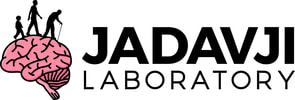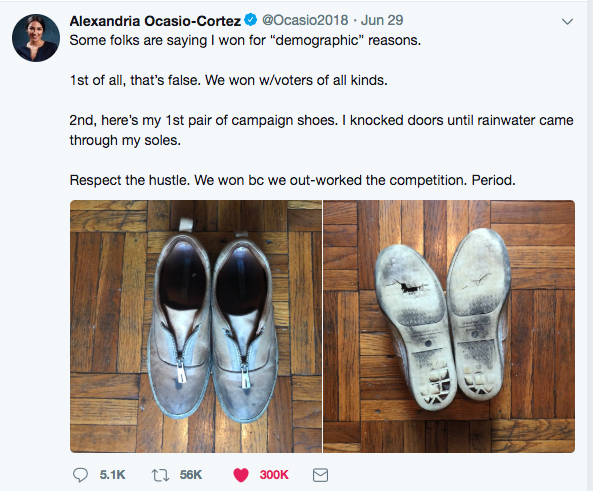|
Last summer (2018), I read this tweet from Alexandria Ocasio-Cortex and it made me realize I was in the midst of my own hustle! Landing a STEM tenure-track position in 2019 is a feat! Less than 20% of PhDs in STEM end up in a faculty position1. This statistic is a result of several factors, one of which includes overcoming a high number of rejections. I was recently on the academic job market and I have decided to write about my experiences.
I completed my PhD in 2012 at McGill University in Canada, afterwards I packed my bags to start a postdoc in Berlin, Germany and then returned to Canada 2 years later. My entire postdoc training lasted 6 years. During my postdoc I published 34 peer reviewed studies (average impact factor of 3.84), 2 book chapters, and 31 abstracts. I obtained $324,000 CDN (~$255,000 USD) in research funding, supervised 26 students in the lab, taught 15 courses, and volunteered my time to service activities (e.g. peer reviews, board membership, etc.). In addition to my research, teaching, and service activities, I applied for 427 faculty positions. From those applications, I had 17 online/telephone interviews and 10 on-campus visits. In 2018, I was offered a tenure track position. It’s been a long journey to get here. When I started my postdoctorate, I didn’t think it would be this difficult, I was very naïve. During my job searching years I read lots of articles, books, and blog posts about different aspects of the process. One thing that resonated with me at the time was that the academic job search is a hard process, there is a lot of rejection, and everyone has their own path. For most job applications I submitted, I did not hear anything. When I made it to the interview process, I always made a point of asking for feedback if I wasn’t selected for the position. Feedback I was given included being told that I didn’t act like PI, didn’t have high impact papers, that I don’t smile enough, or my requests for feedback were ignored. Setting up an on-campus interview was sometimes difficult, one school contacted me for an interview, and they proposed only one date. The chair of the committee yelled at me on the phone because I could not make it due to personal conflicts. When I didn’t hear back from that school, I was relieved. Some schools I interviewed at ended up hiring other Assistant or Associate Professors, which was really difficult to digest, since there was no way I could compete with some that had research funds and a faculty appointment. It was hard to hear some of negative comments or nothing at all, but reflecting back on them, I knew that those were places I did not want to be. A lot of preparation goes into the faculty job applications and process, I will outline what I found most useful for each step. Most faculty applications require a cover letter, CV, research proposal, and teaching statement. Schools in the US also require a diversity statement, this is not common in Canada (yet). My biggest advice for writing job documents, is to get examples and after you have written a draft, get feedback from anyone who will read your documents. Also, start drafting these documents early! Have a set of materials that you can revise for each application, do not re-write any of these documents from scratch, this will take hours. Of course, tailor each application for each position. When I first started writing my job documents, I looked for examples on the internet and then framed my documents to those. I was constantly revising them. Then in 2016 I took a writing course, where I discovered the Professor Is In. I read her book and began using the guidelines she provided. The main message I got from her was to stick to the facts and remove any emotion from your applications. You want to show the search committee you are going to get funding, mentor/teach students, get tenure, and not cause issues. In Spring 2018 I had 5 interviews and no offers; I spent the summer re-writing all my job documents in preparation for the fall 2018. Interestingly enough I was hired at a University where I used ‘older’ job documents, it’s funny how things work out. References letters are a big component of the job application, since 2014 I have seen an increase in the number of jobs that require you to submit references with your application and not when you have been shortlisted. This sucks a lot! References start saying no after you ask them for 10th time, or they just don’t respond to requests. Through FuturePI Slack, I discovered that there are programs like Interfolio where references can upload general letters that can then unanimously be sent to different schools. I think the one downfall of this service is that the letters might not be as tailored, but at least you’ll have a complete application. When I was applying for jobs, I also wrote a lot of my own reference letters, which is hard, but with practice I learned to outline my strongest points, and also used templates from the Professor Is In. More and more schools are doing online interviews prior to inviting candidates for on-campus interviews. For both online and on campus interviews, preparation is key. For the online interview having text prepared is my best advice. Prepare answers to questions like, why do you want the job? What courses do you plan to teach and develop? What is your research program? What will be the experiments you will do within the first year of starting your lab? After you have these questions generated, practice your answers over and over again. Also, generate a list of question you can ask the committee. An important lesson I learned during the interview process was that the questions you ask need to show your interest in the job. So, stick to questions like what support do new faculty at the University of X have for grant writing? What is the teaching load like? Getting an on-campus interview, is a huge achievement. Celebrate it and then get to work, on preparing for it! There are a lot of resources out there, again, I highly recommend the Professor is in. A few points I think are really important, try to relax during the interview, it’s ok to be nervous and it takes some practice to relax, but it is important. Practice your research talk over and over again, if you can add a joke or two, to lighten the mood. I am an informal person, so I found making a joke at the end of my talks by thanking my research subject (aka the mice) always lightens the mood. At dinners ask about the area, good schools (if you have kids), and what social things there are to do in the area. Talk to your interviewers as colleagues. Expect to have a ton of one on one meetings with other faculty members. Be ready to repeat yourself a lot, but remember it is OK. For each meeting with a faculty member prepare a potential collaboration or some way you can help the faculty you are meeting with. Be ready to ask about their research and be excited about it! Be kind to administrative assistants, who are arranging the trip for you. Respond to their e-mails promptly and thank them. Keep in mind you are interviewing the institution as well. There are these so called ‘illegal questions’ (e.g. Will your spouse move with you? Are you pregnant or planning to get pregnant?). They should not be asked, but they will be asked. I think in all 10 on-campus interviews that I had, someone asked me at least one. My strategy was to answer them, quickly and succinctly, then get back to talking about my science, teaching, or service contributions. If you are on the job market or going to be, know this lots of people will offer your advice with good intentions in mind. Some advice will be useful, and others might not be. Seek advice, gather information, but keep in mind your path on the academic job market will be unique. Not all the advice you receive will be applicable to your situation, including this blog, so be selective. Again, I recommend the Professor Is In for every step of your academic training and career development. If you do plan to pursue an academic job, I would recommend joining the Future PI Slack group, I found this group useful for bouncing off ideas, sharing my experiences, getting feedback on my job documents, reading about other experiences, and getting support during the application and interview process. Like I mentioned earlier, I read a lot of articles about the job search process. I found these stories and anecdotes to be beneficial during a very stressful period, so I am adding mine to the universe in hope that it will help someone out there. May the force be with you! References: 1. Jadavji NM, Adi M, Corkery T, Inoue J, Van Benthem K. The 2016 Canadian National Postdoctoral Survey Report. 2016.
4 Comments
6/4/2019 09:42:46 am
It is always interesting to me hearing stories about the job market in non-clinical academia. In clinical veterinary medicine, we'll be lucky to get 3 applicants for a position. If you are a reasonable freaking human being and reasonably competent, it's not hard to get a faculty position.
Reply
6/4/2019 02:29:26 pm
I don't think it is easy for everyone. I think there are a lot biases in the hiring process, I experienced several. I didn't think I would, but I did and it sucked.
Reply
6/4/2019 02:44:01 pm
Oh, absolutely agree that biases crop up regardless of where you are going for a job. One would hope it would be less in academia- supposedly we are evidence-based- but in my experience bias can be quite significant. It is certainly frustrating and I'm not sure what can be done about it.
Reply
Nafisa Jadavji
6/5/2019 06:33:12 am
It's a complex situation. I think there are measures that can be taken, but something I have heard come up time and time again is fit. This I think facilitates biases. Leave a Reply. |
Archives
December 2023
Categories |


 RSS Feed
RSS Feed